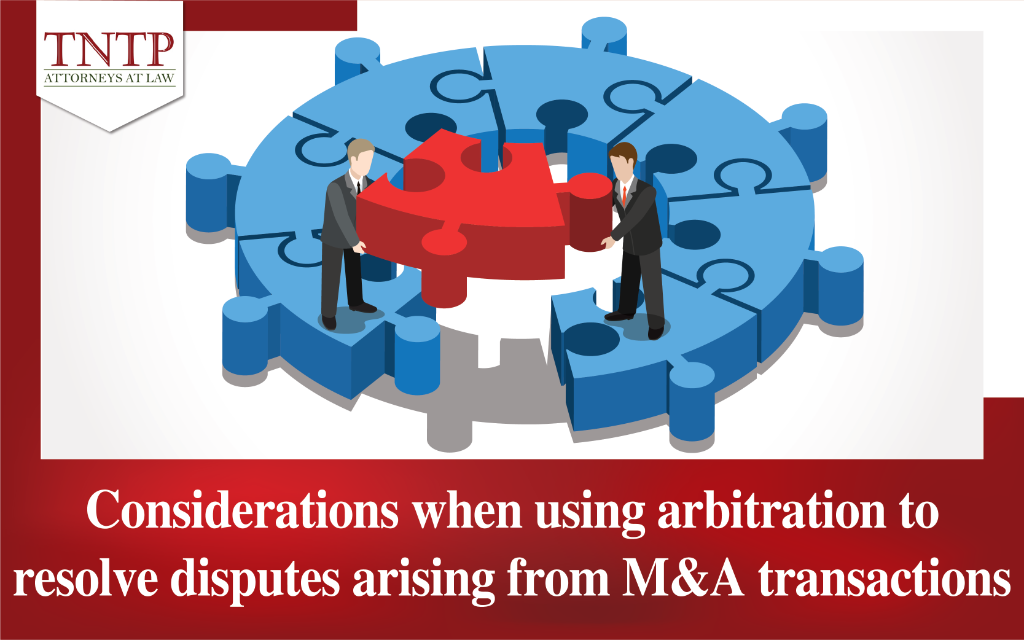Considerations when using arbitration to resolve disputes arising from M&A transactions

Mergers and acquisitions (M&A) have become a popular form of investment in Vietnam today, and disputes arising from M&A transactions are increasingly common. In the event of a dispute, parties can use various methods to resolve disputes, such as negotiation, mediation, arbitration, and court proceedings. So, what should enterprises pay attention to when applying arbitration to resolve disputes arising from M&A transactions? Follow this article by TNTP for answers.
1. Disputes arising from M&A transactions are resolved by Commercial Arbitration only when the parties have an arbitration agreement
According to Clause 1 of Article 5 of the Law on Commercial Arbitration 2010 (“LCA”), a dispute is resolved by Arbitration only when the parties have an arbitration agreement. The arbitration agreement can be made before or after the dispute arises.
Simultaneously, according to Clause 1 of Article 16 of the LCA, an arbitration agreement can be established in two forms: One, as an arbitration clause; or two, as a separate agreement. The arbitration clause is usually defined in the contract signed between the parties or in the annexes of the contract. A separate agreement can be established when a dispute has occurred, and there is no provision for arbitration in the contract.
Moreover, to resolve disputes at Commercial Arbitration, parties also need to properly define the arbitration agreement to ensure that the arbitration agreement is not invalid under Article 18 of the LCA and is not considered impossible to perform under Resolution 01/2014/NQ-HDTP.
Specifically, an arbitration agreement is invalid in the following cases: i) Disputes arise in the domains falling beyond the arbitration’s jurisdiction defined in Article 2 of LCA; ii) The arbitration agreement maker has no competence defined by law; iii) The arbitration agreement maker has no civil act capacity under the Civil Code; iv) The form of the arbitration agreement is incompliant with Article 16 of LCA; v) A party is deceived, intimidated or compelled in the course of making the arbitration agreement and requests a declaration that such arbitration agreement is invalid; vi) The arbitration agreement breaches prohibitions specified by law.
The arbitration agreement cannot be performed in the following cases: i) The parties concerned have an agreement to resolve their disputes at a specific arbitration center which has now shut down without any arbitration center that inherit its cases, and the parties concerned fail to reach an agreement on another arbitration center to resolve their disputes; ii) Bother parties have an agreement on appointment of a specific arbitrator to resolve disputes, but when the dispute arises, because of force majeure events or objective difficulties, such arbitrator cannot resolve the case, or the arbitration center or court cannot find the arbitrator as agreed by the parties concerned, and the parties concerned also fail to reach an agreement to select a substitute arbitrator; iii) Bother parties have an agreement on appointment of a specific arbitrator to resolve disputes, but when the dispute arises, such arbitrator refuses the appointment or the arbitration center refuses the arbitrator appointment, and the parties concerned also fail to reach an agreement to select a substitute arbitrator; iv) The parties concerned have an agreement to resolve their disputes at a specific arbitration center but a set of arbitration rules of another arbitration center, which is different from the arbitration rules of the agreed arbitration center, is applied, the charter of the arbitration selected by both party does not allow the application of arbitration rules of other arbitration centers, and the parties concerned fail to reach an agreement on substitute set of arbitration rules; v) The goods/service seller and consumers have an overall agreement on provision of goods/services that contain arbitration terms drafted by the seller as prescribed in Article 17 of LCA, but the consumers refuse to have the dispute that arises resolved by an arbitral tribunal.
2. Enterprises need to pay attention to the selection of arbitrators
An arbitrator is considered the person who will examine, adjudicate, and make a decision to resolve the case. Typically, disputes related to M&A are complex, requiring the arbitrator with deep expertise, to understand the essence of the transactions as well as the law. Therefore, when choosing to resolve disputes through arbitration, enterprises need to pay attention to the selection of arbitrators. Choosing a suitable arbitrator will be a key factor in ensuring that the dispute is resolved most accurately, objectively, and effectively.
3. Understand and fully implement the arbitration procedures and processes
To best protect their legal rights and interests, parties need to first understand the legal regulations on the procedures and processes of arbitration. In case the parties choose a specific Arbitration Center to resolve the dispute, the parties must further understand the Procedural Rules of this Arbitration Center. The parties who understand their rights and obligations in the dispute resolution process can correctly and fully implement the arbitration procedures and processes. Depending on whether the party’s status in the dispute is as a claimant or respondent, the parties need to pay attention to some contents about filing and sending a lawsuit; and the timing of sending the defence brief to the Arbitration Center;…
Above is the content of the article “Considerations when using arbitration to resolve disputes arising from M&A transactions”. We hope the article is useful to our readers.
Sincerely,



